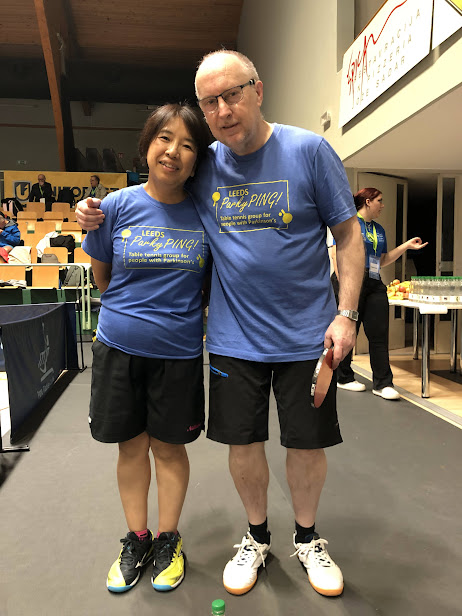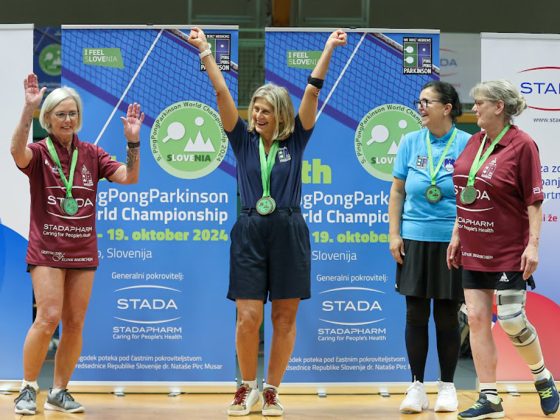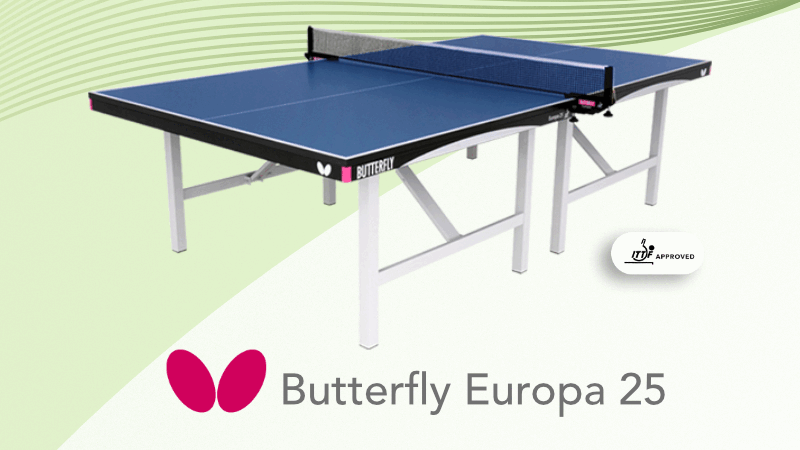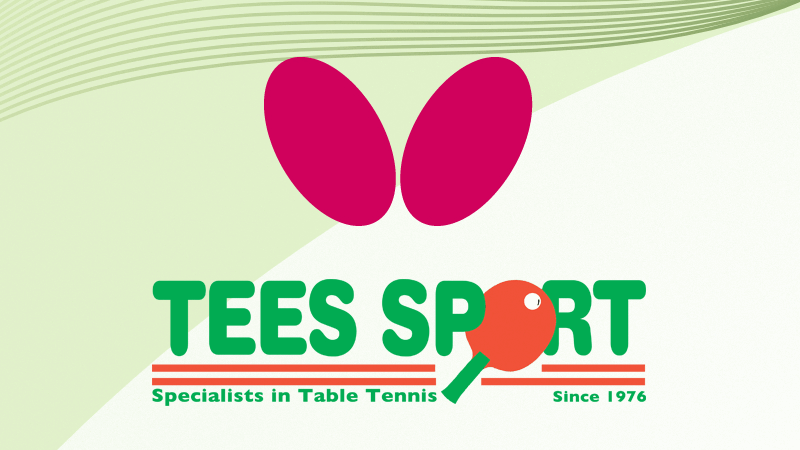There was a ‘medley of medals’ for English players with Parkinson’s at the recent fifth PingPongParkinson World Championship in Slovenia.
One of the competitors, Rob Cook of Leeds, shares his experience and reports on the success.
For people living with Parkinson’s, exercise, and table tennis in particular, is the best and perhaps only way of slowing down the progression of Parkinson’s.
I was part of a team of English players who took part in the recent PingPongParkinson World Championships in Slovenia. As well as the challenge and the pleasure of competition, this event provides a brilliant, supportive community.
The small and picturesque Slovenian town of Lasko welcomed more than 300 competitors, many with supporters and partners, from 28 countries including Japan, USA and Brazil, with Germany sending by far the biggest contingent. 30 tables were in constant use across five days of competition.
People with Parkinson’s play table tennis in one of three ‘classes’, defined by factors including time since diagnosis, effect of Parkinson’s on daily life and age, with the best table tennis players generally in Classs 1. For each competition there is a ‘Consolation Cup’ (or plate), for people who get knocked out in the group stage of each competition, which runs in parallel to the ‘main’ competition.
The undoubted star of the show for England was Gillian Lacey-Solymar, who has only been playing table tennis for a few months and, as she says herself, has never played any competitive sport. But having been introduced to table tennis she’s really caught the bug! After getting a highly creditable bronze with Gary Lee, in the Class 2 mixed doubles, Gillian took gold in the Class 3 women’s singles.
Gillian (pictured above on the top of the podium – photo by Sanjin Strukic) is a member of the Movers & Shakers group whose award-winning podcast is raising awareness about Parkinson’s. Gillian is also proving a strong advocate for the benefits of table tennis.
This was my third successive world championship and for the first time I moved up to Class 2, so I wasn’t sure what to expect. I was pleased to finish second (out of six) by winning the final match of an excellent round-robin group with players all taking matches off each other. I dug deep to beat two Germans in successive knockout rounds, before falling to a third – Matthias Schwarz, who went on to win the title – in the semi-final.
In both men’s and mixed doubles I had the daunting prospect of playing at Class 1, as my respective partners were at that level. Neil Stainthorpe and I played pretty well, but were outclassed.
I played mixed for the third year in a row with Mayumi Kanie, from Japan. We’d reached the Class 3 final in 2022 and lost in five to the eventual winners in Class 2 last year. We narrowly failed to get through our group but then reached the semi of the Consolation Cup. We found ourselves 2-0 up on an extremely strong German pair before they got themselves together and clawed the match back – very disappointing for me and Mayumi.
PingPongParkinson World Championship is a fantastic event in how it brings people together to create new bonds through table tennis, with the level of competition increasing each year.

English medals were won by:
- Gillian Lacey-Solymar (London): gold, women’s singles (Class 3)
- Rob Cook (Leeds): bronze, men’s singles (Class 2)
- Gary Lee (Essex) and Gillian Lacey-Solymar (London): bronze, mixed doubles (Class 2).
- Rob Dawson (Sheffield) with Sandra Muller (Germany): silver, mixed doubles (Class 1 Consolation Cup)
- Gillian Lacey-Solymar (London) with Petra Kuhnert (Germany): silver, women’s doubles (Class 3 Consolation Cup)
- Rob Cook (Leeds) with Mayumi Kanie (Japan): bronze, mixed doubles (Class 1 Consolation Cup)
- Pauline Jones (Essex): bronze, women’s singles (Class 2 Consolation Cup)
- Liz Houghton (Bedford) and Pauline Jones (Essex): bronze, women’s doubles (Class 2 Consolation Cup)
- Liz Houghton (Bedford) and Pauline Jones (Essex): bronze, women’s doubles (Class 2 Consolation Cup)
Want to know more about table tennis and Parkinson’s?
If you are living with Parkinson’s, or know someone who is, you can find a local table tennis group through the Parkinson’s UK website.
Read Table Tennis England’s People with Parkinson’s Partnership Review.
Blogs by people with Parkinson’s which talk a lot about table tennis:





